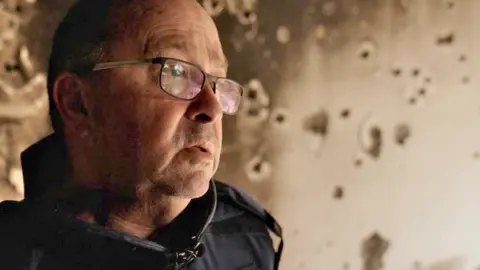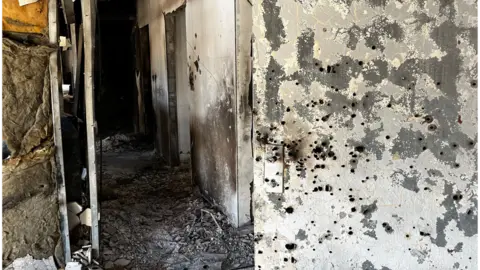In Kibbutz Be'eri, a broken promise to keep Israelis safe
Kibbutz Be'eri - three miles from Gaza - never felt like the frontline of a conflict.
It looks like one now. Its empty streets are a canvas of rage.
In the house where seven members of Gilad Korngold's family were taken hostage by Hamas, it's hard to find any sign or scrap of family life.
Machine-gun fire has gouged holes across the walls; rooms are collapsed and gutted by fire; bullets have made lacework of the metal doors.
"Look at this!" Gilad cries, holding back tears, as we walk inside. "How they hate us."
The safe-room door held fast against the bullets, but the steel shutters outside were blown open, and his family has gone. Among them are his son Tal, daughter-in-law Adi, his eight-year-old grandson Naveh and three-year-old granddaughter Yahel.
It's the first time he's seen the house, which belongs to Adi's parents, since the attack.
"It'll take generations to rebuild [the kibbutz], if they build a new one," he told me. "I think a lot of people will not return."
What was broken here was not just the houses, but the promise Israel made to its people that it could keep them safe, even three miles from a territory run by a group committed to Israel's destruction.

"It was an illusion," said Gilad. "For 25 years, a long illusion. This is what everybody thought: we were safe here, we were strong. But after this happened, I hope somebody will wake up and start another strategy."
Standing in the empty house, the twin pressures on Israel's Prime Minister Benjamin Netanyahu are clear.
Both Mr Netanyahu and his armed forces have a tough task ahead to rebuild trust in Israel's ability to protect its people.
At the same time, public pressure is growing on the government to secure the return of more than 200 hostages held in Gaza, including Gilad's son, daughter-in-law, and two grandchildren.
With backroom negotiations reportedly continuing, Hamas has suggested it could release the hostages in return for all Palestinian prisoners held in Israel's jails.
Many relatives, including Gilad, say that Israel should do whatever it takes.
But the man Israel holds responsible for this attack - the Hamas leader in Gaza, Yahya Sinwar - was himself released in a prisoner exchange deal 12 years ago.
Mr Netanyahu faces a difficult decision: whether or not to gamble with the country's future security in order to get the hostages out now.
He has already faced challenging conversations with the families of some hostages over Israel's intense bombardment of Gaza, insisting that there is no conflict between the government's two priorities of destroying Hamas and protecting the hostages.
"The key is the degree of pressure," he told the families last week. "The greater the pressure, the greater the chances."
But many families need convincing.

Gilad said he and his family had sat up all night last week when Israel escalated its air strikes on Gaza, watching for any news of the hostages there. It was "a terrible night", he said.
Public attitudes seem to be shifting behind the hostage families. More people are joining the rallies organised by them after a widespread media campaign.
And a poll by a major Israeli paper just before the ground invasion of Gaza suggested that less than a third of people supported it, down from more than two-thirds a week before.
During that time, Hamas released four hostages, drip-feeding them out two by two. The unspoken message planted in many minds here was that there could be more.
But early indications suggest that public opinion on whether to release Palestinian prisoners in exchange is deeply divided.
The government's war aims have sparked a startling national unity over the past few weeks. Could the methods used to achieve them prove more divisive?
At the families' memorial site in Tel Aviv, a new clock is ticking up the hours of the hostages' captivity. Its bright digits tick on through daytime speeches and candlelit vigils relentlessly.
Around it, posters of those taken hostage by Hamas paper every wall - frozen, along with their families, in the final messages or moments from three weeks ago.
Meanwhile, Israel has changed irrevocably.
In Be'eri, the sounds of Israel's continued bombardment of Gaza land in the empty streets every minute or two.
Cradled in the ashy scraps of garden, Gilad spots his grandson's football - preserved untouched beneath a layer of gritty soot.
The buried treasure of an earlier life.

More on Israel-Gaza war
- Watch: Israel's UN envoy pins yellow star to chest
- Reporting on Gaza: 'Sometimes from behind the camera I just stand and cry'
- Explained: What is happening in Israel and Gaza, and why now?
- History behind the story: The Israel-Palestinian conflict

